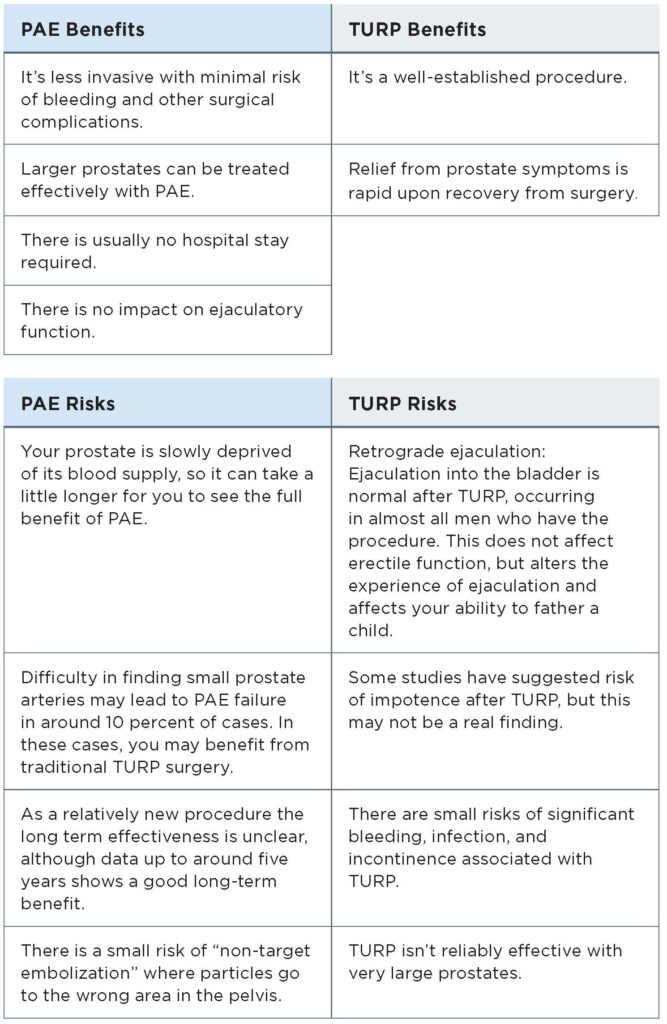
Home PROSTATE SURGERY: IS THERE AN ALTERNATIVE TO TURP?
As men age, their prostate grows; it’s a fact of life. It’s usually not a serious problem, but over 30 percent of men aged 50 and over require treatment for an enlarged prostate and for some of them that means surgery.
The prostate gland sits underneath the bladder and surrounds part of the urethra, the tube that carries urine and semen out of your penis. Normally, it’s the size and shape of a walnut, but as men age it can sometimes get too big and start to squeeze the urethra. This is called benign prostatic hyperplasia (BPH). It can disturb sleep with frequent urination overnight, or cause a hard time urinating or a weak stream when you do start.
BPH is not prostate cancer, nor does it make you more likely to get it. It’s a common condition with a number of treatment options, ranging from lifestyle changes to medication to surgery. Your health care practitioner can help you determine the best option for you based on your age, health, and current symptoms.
In cases of surgery, the most commonly performed procedure is a transurethral resection of the prostate (TURP). Very large prostates are not effectively treated with TURP, so an open surgery is usually performed to completely or partially remove the enlarged prostate. These are not the only options however. Mayfair Diagnostics radiologists have been successfully performing prostate artery embolization (PAE) procedures as an alternative to surgery in Calgary hospitals since 2012.
First performed in 2009 by Professor Pisco in Portugal, this new procedure shrinks an enlarged prostate by non-surgically blocking the arteries that feed the gland. An interventional radiologist, rather than a surgeon, performs the procedure through a pinhole in the groin.
The interventional radiologist will use X-ray guidance to move a small plastic tube into the small arteries which are feeding the prostate. A special X-ray dye is injected down the catheter to identify the prostate blood supply. Then fluid containing thousands of tiny plastic particles is injected into these small arteries to block them and starve the prostate of its blood supply.
PAE is done using a local anesthetic in the groin and intravenous painkillers and/or sedatives, if needed. A catheter is inserted into the bladder for a few hours during the procedure.
During a TURP, an instrument is inserted into the tip of your penis and extended through your urethra into the prostate area. Your doctor will then use it to trim tissue from the inside of your prostate gland, one small piece at a time, to remove the section of the prostate that is blocking urine flow. As small pieces of tissue are removed, irrigating fluid carries them into your bladder.
TURP is done using a general or spinal anesthetic and a catheter will be inserted into your bladder. It usually requires a one- or two-day stay in the hospital and the catheter is generally left in place for at least 24 to 48 hours, until the bleeding subsides.

PAE procedures are covered under the Alberta Health Care Insurance Plan. Your doctor or specialist will need to fax a consultation request to Rockyview General Hospital’s Diagnostic Imaging department at 403-592-4852. Once the information has been received our interventional radiology team will review the request and contact you to arrange a consultation to determine if the procedure is appropriate based on your medical history. There may also be imaging required.
REFERENCES
Abt, D., et al. (2018) “Comparison of prostatic artery embolisation (PAE) versus transurethral resection of the prostate (TURP) for benign prostatic hyperplasia: randomised, open label, non-inferiority trial.” BMJ 2018; 361:k2338.
Gao, Y., et al. (2014) “Benign Prostatic Hyperplasia: Prostatic Arterial Embolization versus Transurethral Resection of the Prostate—A Prospective, Randomized, and Controlled Clinical Trial.” Radiology, Mar; 270 (3): 920-28.
Johns Hopkins Medicine (2022) “Prostatic Artery Embolization.” www.hopkinsmedicine.org. Accessed September 1, 2022.
Mayo Clinic Staff (2022) “Transurethral resection of the prostate (TURP).” www.mayoclinic.org. Accessed September 1, 2022.
Healthwise Staff (2021) “Transurethral Resection of the Prostate (TURP) for Benign Prostatic Hyperplasia.” www.myhealthalberta.ca. Accessed September 1, 2022.
Nickel, J.C., et al. (2018) “Canadian Urological Association guideline on male lower urinary tract symptoms/benign prostatic hyperplasia (MLUTS/BPH): 2018 update.” Canadian Urological Association Journal, Oct. 4(5): 310-16.
Urology Care Foundation (2021) “What is Benign Prostatic Hyperplasia (BPH)?” www.urologyhealth.org. Accessed September 1, 2022.
We foster a supportive and collaborative culture designed to encourage positive patient experiences and build strong working relationships across the organization:
Our core values shape the way we work with patients, partners, and fellow employees. And, more than anything else, they’re what set Mayfair apart. In everything we do, this is what we strive for:
EXCELLENCE
We share a commitment to high quality and excellence in all that we do. This commitment calls on all of us to achieve the very best of our capabilities and exceed our own expectations.
CURIOSITY
We innovate in everything, from services to processes. We believe meaningful change and effective problem solving come only by looking at challenges and opportunities from new angles and by exercising our creativity and curiosity.
PASSION
We show pride, enthusiasm, and dedication in everything that we do. We are committed to producing and delivering high-quality results and services. We are passionate about our industry and about our company, services, partners, and patients.
COLLABORATION
Our team is supportive of each other’s efforts; we are loyal to one another; and we care for one another both personally and professionally. We promote and support a diverse, yet unified, team. We work together to meet our common goals across Mayfair clinics, locations, and geographies. Only through collaboration on ideas, technologies, and talents can we achieve our mission and vision.
SERVICE
We take pride in delivering exceptional service every day. We listen to every request with an open mind, always looking for opportunities to go above and beyond to create memorable, personalized experiences. We take responsibility to answer our referrers’ and patients’ requests and respect their time by always responding with a sense of urgency.
Start a career with Mayfair Diagnostics — one of Western Canada’s leading medical imaging teams.
Headquartered in Calgary, Alberta, we’ve been helping people f ind clarity for their health for over 100 years. At our clinics in Calgary and area, Regina, and Saskatoon, our team of radiologists, technologists, and support staff work in a truly integrated way to provide exceptional experiences for our patients. Joining our team is more than a job. It’s an investment in your future — a plan for success.
OUR PEOPLE
Our people share our quest to make a difference in our patient’s lives. We’re a team of professionals, disciplined in our skills and compassionate with our patients, providing the care and attention they need. At our core, we are a trusted partner in our patients’ health care journey. Our patients, physicians, and other health care providers rely on us for quality imaging to help manage their patient’s health care decisions with certainty. But our business is about more than just imaging. It’s about building lasting relationships and making a meaningful difference in the lives of those we meet.
OUR VISION
A world in which every person has clarity about their health. We push the boundaries of what is possible and embrace change as an opportunity. We strive to be thought leaders and encourage creativity by providing a safe place for calculated risk taking. We learn from our mistakes. We share best practices across our operations and are recognized by our peers for our work. We engage the best to help propel us forward in achieving our goals.